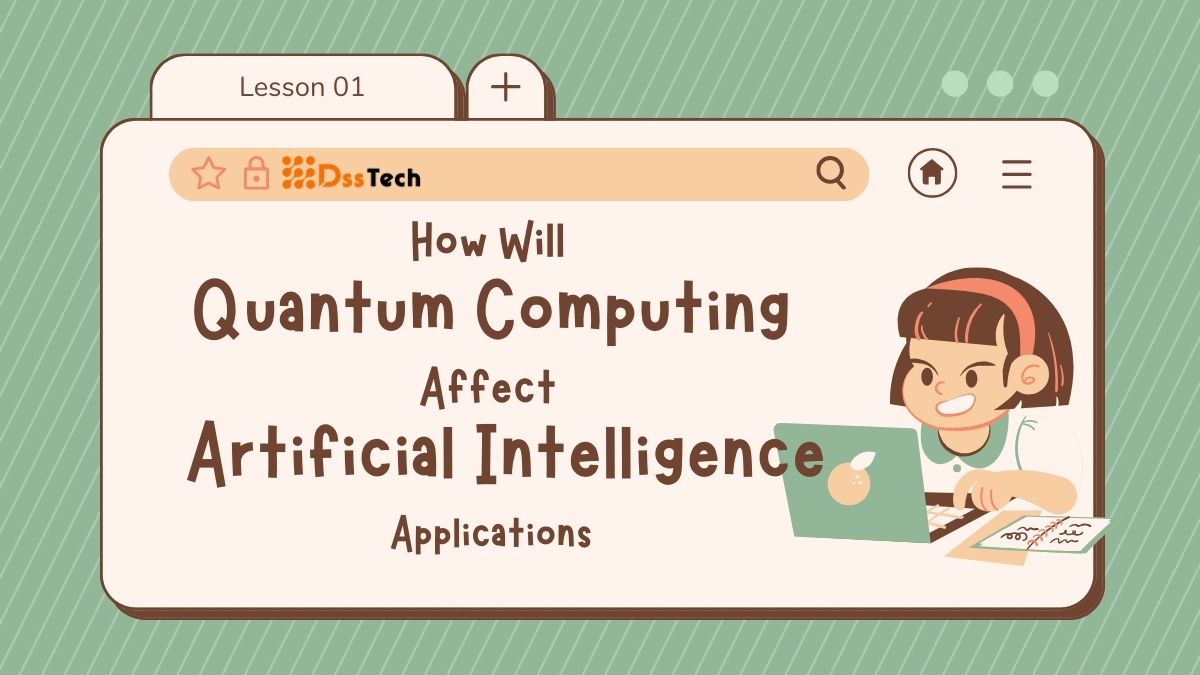1. Introduction
Quantum Computing and Artificial Intelligence (AI) represent two cutting-edge fields that have captured the imagination of scientists, researchers, and tech enthusiasts alike. Understanding the intricacies of these domains is essential for grasping the transformative potential they hold, both individually and in synergy. As we peer into the future, a key question arises: How will Quantum Computing Affect Artificial Intelligence Applications?
Delving into this inquiry promises insights into the collaborative evolution of these technologies, revealing novel pathways for enhancing AI capabilities through the unique computational strengths offered by quantum systems.
1.1 Definition of Quantum Computing: Quantum computing harnesses the principles of quantum mechanics to process information in ways fundamentally different from classical computers. At its core are quantum bits or qubits, which can exist in multiple states simultaneously, thanks to the phenomena of superposition and entanglement. This departure from classical binary bits allows quantum computers to perform complex computations exponentially faster.
1.2 Definition of Artificial Intelligence: Artificial Intelligence refers to the development of algorithms and systems that enable machines to mimic cognitive functions such as learning, reasoning, problem-solving, and decision-making. AI encompasses a wide spectrum, from rule-based systems to sophisticated machine learning and deep learning models, enabling applications across diverse sectors like healthcare, finance, and autonomous systems.
1.3 A Brief Overview of Their Current Status and Importance: As of the present, both quantum computing and AI are at pivotal junctures in their respective evolutionary paths. Quantum computers, while in their infancy, have demonstrated unprecedented computational capabilities in specific tasks, showcasing the potential to revolutionize fields such as cryptography, optimization, and simulation.
Concurrently, AI has experienced rapid advancements, with machine learning algorithms becoming integral to everyday applications, from virtual assistants to recommendation systems. The symbiotic relationship between big data and AI has fueled breakthroughs, making AI an indispensable tool in scientific research, business analytics, and beyond.
The importance of understanding the intersection of quantum computing and AI lies in the promise of unlocking new dimensions of computational power. Quantum computing has the potential to enhance the efficiency of AI algorithms, enabling the processing of vast datasets and solving complex problems that were previously insurmountable.
In this article, we delve into the intricate connections between quantum computing and AI, exploring how their convergence might shape the future of technology and redefine the boundaries of what is computationally possible.
Quantum computing stands as a paradigm-shifting approach to information processing, relying on principles from quantum mechanics that defy the conventions of classical computing.
2.1 Explanation of Quantum Bits (Qubits) and Superposition: At the heart of quantum computing are quantum bits, or qubits, which deviate significantly from classical bits. Unlike classical bits that can only exist in a state of 0 or 1, qubits can exist in a superposition of both states simultaneously. This unique ability arises from the principles of quantum superposition, allowing quantum computers to process a multitude of possibilities in parallel.
2.2 Key Principles of Quantum Entanglement: Quantum entanglement, another cornerstone of quantum mechanics, is a phenomenon where two or more particles become interconnected, regardless of the distance separating them. Changes to the state of one entangled particle instantaneously affect the state of the others. In quantum computing, entanglement enhances the connectivity of qubits, enabling them to work collaboratively and share information in ways that classical bits cannot.
2.3 Comparison with Classical Computing: Contrasting quantum computing with classical computing reveals stark differences in their underlying principles and computational approaches. Classical computers rely on bits that are in a definite state of 0 or 1, processed sequentially through logic gates. In contrast, quantum computers leverage the superposition and entanglement of qubits to perform parallel computations, potentially solving certain problems exponentially faster than classical counterparts.
While classical computers excel at tasks with well-defined solutions, quantum computers exhibit unparalleled efficiency in addressing complex problems, such as factorization, optimization, and simulation. The comparison between quantum and classical computing underscores the transformative potential of quantum computing, especially in domains where the limitations of classical computation become bottlenecks.
Understanding these fundamental aspects of quantum computing lays the groundwork for exploring its potential applications, particularly in the realm of artificial intelligence. The unique properties of qubits and the principles of quantum entanglement set the stage for a new era in computational capabilities, prompting researchers and technologists to ponder how will Quantum Computing affect Artificial Intelligence Applications.
This exploration goes beyond theoretical curiosity, as it holds the promise of unlocking unprecedented computational power and efficiency, potentially revolutionizing the way AI algorithms operate and solving complex problems previously deemed insurmountable.
3. How Will Quantum Computing Affect Artificial Intelligence Applications: Current State of Artificial Intelligence
Artificial Intelligence (AI) has evolved rapidly in recent years, becoming an integral part of various fields and demonstrating transformative potential in solving complex problems. However, the current state of AI is not without its challenges, especially when faced with the limitations of classical computing.
3.1 Overview of AI Applications in Various Fields: AI applications have permeated diverse sectors, bringing about innovations that impact our daily lives and industries. In healthcare, AI algorithms aid in diagnostics, personalized medicine, and drug discovery. In finance, AI powers predictive analytics, algorithmic trading, and fraud detection. Transportation benefits from AI-driven autonomous vehicles, while in customer service, virtual assistants and chatbots enhance user interactions.
Moreover, AI plays a crucial role in image and speech recognition, natural language processing, and recommendation systems. In scientific research, AI aids in data analysis and pattern recognition, accelerating discoveries in fields like astronomy, biology, and physics. The wide-ranging applications of AI underscore its versatility and potential to revolutionize various aspects of human endeavors.
3.2 Limitations of Classical Computing in AI Tasks: While classical computing has been the backbone of AI development, it encounters bottlenecks when faced with certain AI tasks. Traditional computers excel in processing structured data and performing rule-based computations. However, when confronted with unstructured data, such as images, videos, or natural language, the limitations become evident.
Classical computing struggles with the complexity and dimensionality of big data, often leading to extended processing times and increased computational demands. Training deep learning models, which are integral to many AI applications, can be computationally intensive and time-consuming on classical hardware. As AI continues to advance, the need for more efficient computational methods becomes increasingly apparent.
The intersection of AI and quantum computing holds promise in overcoming these limitations. Quantum computing’s ability to process vast datasets and perform parallel computations aligns with the demands of AI tasks, potentially unlocking new avenues for innovation.
Exploring the current state of AI, while acknowledging the constraints of classical computing, sets the stage for understanding the potential impact of quantum computing on enhancing AI capabilities in the future.
4. The Promise of Quantum Computing in AI
Quantum computing presents a paradigm shift with the potential to revolutionize artificial intelligence (AI) by leveraging its unique properties to address computational challenges inherent in classical systems.
4.1 Quantum Parallelism and Its Impact on Machine Learning: Quantum parallelism is a cornerstone of quantum computing, allowing quantum computers to process a vast number of possibilities simultaneously. In the context of AI, this feature holds immense promise for machine learning tasks. Traditional machine learning algorithms on classical computers operate sequentially, limiting their speed and efficiency.
Quantum parallelism, however, enables quantum machine learning algorithms to explore multiple solutions concurrently, potentially exponentially speeding up the training and inference processes.
The ability of quantum computers to consider numerous scenarios in parallel offers a significant advantage for tasks like optimization, pattern recognition, and data classification—core components of machine learning. This promises breakthroughs in the development of more sophisticated and efficient AI models, particularly in scenarios where classical approaches face computational bottlenecks.
4.2 Quantum Machine Learning Algorithms: An Overview: Quantum machine learning algorithms harness the principles of quantum mechanics to enhance the efficiency of classical machine learning tasks. Notable examples include Quantum Support Vector Machines, Quantum Principal Component Analysis, and Quantum Boltzmann Machines. These algorithms aim to capitalize on quantum parallelism and other quantum phenomena to outperform their classical counterparts.
Quantum algorithms also exhibit resilience to certain types of noise and interference, offering advantages in maintaining accuracy and reliability, especially in complex AI applications. Researchers are actively exploring the integration of quantum machine learning algorithms into existing AI frameworks, with the aim of achieving quantum advantage—solving problems more efficiently than classical methods.
While quantum machine learning is still in its nascent stages, the promise it holds for transforming AI is undeniable. As quantum computing technology advances, the synergy between quantum computing and AI is poised to unlock new possibilities, pushing the boundaries of what can be achieved in terms of computational efficiency and problem-solving capabilities.
The exploration of quantum parallelism and quantum machine learning algorithms represents a crucial step in realizing the potential of quantum computing in shaping the future landscape of artificial intelligence.
5. Quantum Neural Networks
Quantum neural networks represent a novel frontier at the intersection of quantum computing and artificial intelligence, holding the promise of enhancing the capabilities of traditional neural networks while introducing unique challenges and opportunities.
5.1 Introduction to Quantum Neural Networks: Quantum neural networks (QNNs) are a specialized class of quantum machine learning models designed to process information inspired by the structure and functioning of classical neural networks. Unlike classical neural networks that operate on classical bits, QNNs leverage quantum bits (qubits) and quantum gates to encode and process information.
This unique architecture allows for the exploitation of quantum parallelism and entanglement in the context of neural network computations.
In quantum neural networks, qubits represent the neurons, and quantum gates mimic the synaptic connections between neurons. This quantum parallelism enables QNNs to explore multiple pathways simultaneously during information processing, potentially offering advantages over classical neural networks in terms of computational efficiency.
5.2 Comparison with Classical Neural Networks: Classical neural networks, built on classical bits and conventional processing units, have fueled the advancements in artificial intelligence witnessed in recent years. These networks excel in tasks such as image recognition, natural language processing, and pattern recognition.
However, as AI tasks grow in complexity, classical neural networks face limitations in terms of scalability and computational speed.
Quantum neural networks, on the other hand, have the potential to address these limitations by harnessing the unique properties of quantum mechanics. Quantum parallelism in QNNs allows for the simultaneous exploration of multiple solutions, presenting a potential leap forward in processing large datasets and solving complex problems.
However, realizing these benefits requires overcoming significant challenges.
5.3 Potential Advantages and Challenges: Potential advantages of quantum neural networks include their ability to handle exponentially growing combinations of features, making them well-suited for certain machine learning tasks. QNNs could excel in optimization problems, quantum-enhanced feature mapping, and pattern recognition, offering a new paradigm for AI applications.
However, challenges abound. QNNs are highly sensitive to noise and environmental factors, posing a considerable obstacle to maintaining the coherence required for quantum computation. Additionally, the integration of quantum neural networks into practical applications necessitates overcoming hardware constraints and refining quantum error correction techniques.
Exploring the potential advantages and challenges of quantum neural networks is crucial for understanding their role in the future of artificial intelligence. As research and development in quantum computing progress, quantum neural networks stand as a promising avenue for unlocking unprecedented computational power in AI, albeit with a set of unique challenges that require innovative solutions.
In this context, it becomes increasingly pertinent to investigate how will Quantum Computing affect Artificial Intelligence Applications. Examining the intersection of quantum computing and AI not only sheds light on the transformative possibilities but also allows for anticipating and addressing the specific challenges that may arise in integrating these cutting-edge technologies.
6. Quantum Computing and Optimization Problems
Quantum computing emerges as a transformative tool in the realm of artificial intelligence, particularly in tackling complex optimization problems that often prove challenging for classical computing methods.
6.1 Solving Complex Optimization Problems in AI with Quantum Computing: Optimization problems are pervasive in artificial intelligence, spanning fields such as logistics, finance, and machine learning. Classical computers face constraints when dealing with large-scale optimization tasks due to the exponential growth in possible solutions.
Quantum computing, with its inherent parallelism and computational efficiency, offers a promising avenue for addressing these challenges.
Quantum computers excel in solving optimization problems by exploring multiple solutions simultaneously. This capability is particularly advantageous in scenarios where the sheer volume of possibilities hinders classical algorithms.
Quantum algorithms for optimization leverage quantum parallelism to assess potential solutions in parallel, potentially providing exponential speedup compared to classical optimization techniques.
6.2 Examples of Optimization Tasks in AI and How Quantum Computing Can Improve Them:
- Travelling Salesman Problem (TSP):
Classical Challenge: TSP involves finding the most efficient route that visits a set of cities and returns to the starting point. As the number of cities increases, classical algorithms encounter combinatorial explosion.
Quantum Solution: Quantum algorithms can explore various routes simultaneously, enabling more efficient solutions for TSP instances with a large number of cities. - Portfolio Optimization:
Classical Challenge: Determining the optimal allocation of assets in a portfolio involves complex trade-offs and is computationally intensive.
Quantum Solution: Quantum computers can evaluate diverse portfolio combinations simultaneously, aiding in faster and more effective optimization of investment strategies. - Machine Learning Model Training:
Classical Challenge: Training large-scale machine learning models involves optimizing numerous parameters, demanding substantial computational resources and time.
Quantum Solution: Quantum optimization algorithms could accelerate the training process by exploring parameter spaces more efficiently, offering potential improvements in model convergence. - Energy Grid Optimization:
Classical Challenge: Optimizing the distribution of energy in a power grid to meet demand while minimizing costs is a computationally demanding task.
Quantum Solution: Quantum algorithms can address the complexities of energy grid optimization by simultaneously considering multiple configurations, leading to more efficient solutions.
The application of quantum computing to optimization problems in AI is not merely theoretical; researchers are actively exploring real-world scenarios where quantum algorithms could provide a substantial advantage. As quantum hardware and algorithms continue to mature, the synergy between quantum computing and optimization in AI holds the promise of solving previously intractable problems, paving the way for more efficient and scalable solutions in diverse domains.
In this evolving landscape, it becomes imperative to consider how will Quantum Computing affect Artificial Intelligence Applications. Understanding the potential impact of quantum computing on AI applications is not only a theoretical exercise but a practical necessity as we navigate towards a future where these technologies intertwine to redefine the boundaries of computational capabilities.
7. Quantum Supremacy and AI
Quantum supremacy, a milestone in quantum computing, represents a stage where a quantum computer can perform a specific task more efficiently than the most advanced classical computers. Understanding the concept of quantum supremacy and its potential implications is crucial in assessing how it could accelerate computations in the field of artificial intelligence (AI).
7.1 Discussing the Concept of Quantum Supremacy: Quantum supremacy is achieved when a quantum computer, equipped with qubits and leveraging quantum gates, can solve a problem that is practically infeasible for the most powerful classical supercomputers. Google’s achievement of quantum supremacy in 2019 marked a historic moment, demonstrating that their quantum processor, Sycamore, could perform a specific task faster than any classical counterpart.
The concept rests on the inherent advantages of quantum parallelism, allowing quantum computers to explore a vast solution space simultaneously. It is important to note that quantum supremacy does not imply general superiority in all tasks but rather signals a breakthrough in quantum computational capabilities for specific problems.
7.2 Implications for Accelerating AI Computations: The implications of quantum supremacy for accelerating AI computations are profound. While quantum supremacy does not directly translate to quantum advantage in all AI tasks, it points towards the potential for significant speedup in specific applications.
- Optimization Tasks:
Quantum supremacy can be particularly impactful in optimization problems commonly encountered in AI. Problems such as hyperparameter tuning, model optimization, and feature selection, which can be computationally intensive for classical computers, stand to benefit from the parallelism inherent in quantum computations. - Simulation and Sampling:
Quantum computers excel in simulating quantum systems and sampling complex probability distributions. In AI, tasks that involve simulating quantum systems, molecular structures, or generating complex datasets for training machine learning models could see accelerated progress. - Cryptographic Tasks:
Quantum supremacy has implications for cryptography, potentially accelerating the development of quantum-resistant cryptographic algorithms. This is crucial for ensuring the security of AI systems against future quantum attacks.
While quantum supremacy is a remarkable achievement, challenges remain, including error correction, maintaining qubit coherence, and scaling quantum systems. As researchers work towards overcoming these challenges, the synergy between quantum supremacy and AI holds the promise of advancing the field by enabling faster computations, driving innovation, and unlocking new frontiers in solving complex problems that were previously impractical for classical computers.
As quantum computing technology progresses, the impact on AI applications is likely to be transformative, ushering in an era of enhanced computational power and efficiency.
8. Quantum Computing Challenges in AI
Quantum computing, while holding immense promise for revolutionizing artificial intelligence (AI), is not without its share of challenges and limitations. Understanding these obstacles is crucial for devising strategies to harness the full potential of quantum computing in the realm of AI.
8.1 Current Challenges and Limitations in Quantum Computing for AI Applications:
- Quantum Error Correction:
Challenge: Qubits are susceptible to errors due to environmental factors, leading to decoherence and loss of quantum information. Quantum error correction is challenging, and maintaining qubit coherence over extended periods is crucial for reliable quantum computations.
Limitation: Errors can compromise the accuracy of quantum computations, impacting the reliability of quantum algorithms for AI tasks. - Limited Qubit Connectivity:
Challenge: Quantum computers often face restrictions in terms of qubit connectivity, meaning not all qubits can be directly entangled with each other. This limits the complexity and scalability of quantum algorithms.
Limitation: Complex quantum neural networks and algorithms that rely on extensive qubit connectivity may be challenging to implement efficiently. - Noise and Interference:
Challenge: Quantum computers are sensitive to external noise and interference, leading to errors in quantum operations. Controlling and mitigating these environmental factors is a significant challenge.
Limitation: High levels of noise can degrade the performance of quantum algorithms, affecting the reliability of quantum-enhanced AI computations. - Hardware and Scaling Issues:
Challenge: Building and maintaining stable quantum hardware is a complex task. Scaling quantum computers to a sufficient number of qubits while minimizing error rates poses considerable engineering challenges.
Limitation: Current quantum computers have limited qubit counts, restricting the scale and complexity of AI tasks that can be effectively tackled.
8.2 Strategies to Overcome These Challenges:
- Quantum Error Correction:
Strategy: Develop robust quantum error correction codes and techniques to enhance the fault tolerance of quantum computers. Implement error detection and correction protocols to mitigate the impact of decoherence. - Enhanced Qubit Connectivity:
Strategy: Explore new quantum architectures and technologies to improve qubit connectivity. Develop methods for long-distance qubit entanglement, enabling the construction of more complex quantum circuits. - Noise Mitigation:
Strategy: Invest in research and development of noise-resistant quantum gates and algorithms. Implement error-robust quantum algorithms and explore quantum error mitigation techniques to improve the reliability of quantum computations. - Advancements in Hardware:
Strategy: Collaborate across disciplines to advance quantum hardware technologies. Invest in scalable quantum architectures, error-reducing hardware designs, and innovations that address the current limitations of quantum computing hardware.
Addressing these challenges requires a concerted effort from researchers, engineers, and the wider scientific community. As advancements in quantum computing technology continue, overcoming these obstacles will pave the way for the effective integration of quantum computing in AI applications, unlocking unprecedented computational power and ushering in a new era of innovation.
In this context, it becomes essential to explore how will Quantum Computing affect Artificial Intelligence Applications. Delving into this inquiry not only helps anticipate the transformative potential but also guides the collaborative efforts needed to harness the synergies between quantum computing and AI, ensuring a seamless integration that maximizes the benefits of these groundbreaking technologies.
9. Quantum Computing and Data Security in AI
The convergence of quantum computing and artificial intelligence introduces a new dimension to data security, raising both challenges and opportunities. Exploring quantum-safe AI algorithms and understanding their impacts on data security and encryption is essential in navigating the evolving landscape of secure information processing.
9.1 Exploring Quantum-Safe AI Algorithms:
- Post-Quantum Cryptography:
Challenge: The advent of powerful quantum computers poses a threat to classical cryptographic methods, such as RSA and ECC, as they become susceptible to quantum attacks.
Quantum-Safe AI Algorithms: Develop and implement post-quantum cryptographic algorithms that can withstand quantum attacks. Lattice-based cryptography, hash-based cryptography, and code-based cryptography are potential quantum-safe alternatives. - Quantum Key Distribution (QKD):
Challenge: Quantum computers have the potential to break conventional key distribution methods, compromising the security of encrypted communications.
Quantum-Safe AI Algorithms: Explore the integration of QKD with AI systems to establish secure communication channels. Quantum-safe key exchange protocols enhance the resilience of AI applications against potential quantum threats.
9.2 Impacts on Data Security and Encryption in AI Systems:
- Encryption Breakthroughs:
Impact: Quantum computers can exponentially speed up certain computations, potentially breaking widely used encryption protocols.
Mitigation: Quantum-safe encryption algorithms prevent the unauthorized access of sensitive data by employing mathematical structures that remain secure against quantum attacks. - Secure Multi-Party Computation:
Impact: Quantum computing may introduce vulnerabilities in multi-party computation protocols used for collaborative AI tasks.
Mitigation: Develop quantum-resistant secure multi-party computation methods to ensure the confidentiality and integrity of shared data in AI collaborations. - AI Model Protection:
Impact: Quantum algorithms may pose a threat to intellectual property by potentially reverse engineering AI models.
Mitigation: Employ quantum-safe techniques to protect AI models, such as homomorphic encryption or secure enclaves, ensuring the confidentiality of proprietary algorithms and training data. - Privacy-Preserving AI:
Impact: Quantum advancements may challenge privacy-preserving AI techniques, particularly in scenarios involving sensitive personal data.
Mitigation: Develop quantum-resistant privacy-preserving AI algorithms that uphold privacy standards while adapting to the evolving threat landscape posed by quantum computing.
The intersection of quantum computing and AI necessitates a proactive approach to data security. Implementing quantum-safe AI algorithms and encryption methods is crucial in safeguarding sensitive information and maintaining the trustworthiness of AI systems.
As quantum technologies progress, the ongoing development and integration of quantum-resistant security measures in AI applications will be pivotal for ensuring the resilience of data protection strategies in the quantum era.
10. Future Integration of Quantum Computing and AI
As quantum computing continues to advance, speculation on its role in shaping the future of artificial intelligence (AI) is rife with anticipation. Examining potential breakthroughs and advancements in AI due to the integration of quantum computing provides insights into the transformative possibilities on the horizon.
10.1 Speculations on the Future Role of Quantum Computing in Shaping AI:
- Quantum Machine Learning Mastery:
Speculation: Quantum computing could propel machine learning to unprecedented levels of efficiency and accuracy. Quantum algorithms may fundamentally change how models are trained, leading to breakthroughs in tasks such as natural language processing, image recognition, and generative modeling. - Solving Previously Intractable Problems:
Speculation: Quantum computing may unlock the solution to complex problems that classical computers struggle to address. Tasks like protein folding prediction, optimization in logistics, and climate modeling could see significant advancements, opening new frontiers for AI applications. - Simulating Quantum Systems:
Speculation: Quantum computers are poised to excel in simulating quantum systems with unparalleled accuracy. This capability has profound implications for AI applications in chemistry, materials science, and drug discovery, where understanding quantum interactions is critical. - Enhanced Cryptographic Security:
Speculation: Quantum-resistant cryptographic algorithms could redefine the landscape of data security in AI applications. Quantum-safe encryption methods may become standard, protecting sensitive information against potential quantum threats.
10.2 Potential Breakthroughs and Advancements in AI due to Quantum Computing:
- Exponential Speedup in Computation:
Potential Breakthrough: Quantum computing’s ability to process information in parallel could lead to exponential speedup in AI computations. This may result in faster training of complex machine learning models, reducing the time and resources required for AI development. - Unraveling Complex Patterns in Big Data:
Potential Advancement: Quantum computing’s prowess in handling vast datasets and exploring multiple possibilities simultaneously may lead to the discovery of intricate patterns and correlations in big data. This could enhance the predictive power and accuracy of AI models. - Quantum Neural Network Innovation:
Potential Breakthrough: Quantum neural networks may evolve into sophisticated architectures that outperform classical neural networks in tasks requiring extensive parallelism. Quantum enhancements could redefine the landscape of deep learning and pattern recognition. - Revolutionizing AI Hardware:
Potential Advancement: Advancements in quantum hardware design and fabrication may lead to the development of scalable, error-tolerant quantum processors specifically tailored for AI applications. Tailored quantum hardware could become a catalyst for transformative breakthroughs in AI performance.
While these speculations and potential breakthroughs paint an exciting picture of the future, it’s important to note that challenges, such as error correction and hardware limitations, must be addressed for the full realization of quantum computing’s impact on AI.
The convergence of quantum computing and AI represents a dynamic frontier with the potential to redefine the capabilities of intelligent systems, offering solutions to problems that were once deemed insurmountable. As research and development in both fields progress, the synergy between quantum computing and AI is poised to shape a future where the boundaries of computational possibilities are continually pushed.
Conclusion
In conclusion, the intersection of quantum computing and artificial intelligence holds immense promise for shaping the future of computational capabilities. As we explore the unique properties of quantum mechanics, such as superposition and entanglement, in the context of AI, a landscape of unprecedented opportunities unfolds.
As we navigate this frontier, it becomes increasingly important to consider how will Quantum Computing affect Artificial Intelligence Applications.
Understanding the potential implications of integrating quantum computing into AI not only opens new avenues for computational power but also prompts thoughtful exploration of the challenges and ethical considerations that may arise in this transformative journey.
Quantum computing’s potential to exponentially speed up computations, tackle complex optimization problems, and enhance the efficiency of machine learning is both intriguing and transformative. The ongoing development of quantum-safe AI algorithms, coupled with advancements in quantum hardware, sets the stage for breakthroughs that may redefine the boundaries of what is computationally possible.
While challenges persist, the symbiotic relationship between quantum computing and AI opens doors to innovative solutions and paradigm shifts, heralding an era where the synergy of these two fields reshapes the landscape of artificial intelligence.
The journey ahead promises not only to accelerate AI applications but also to unravel new dimensions of understanding in the realm of information processing and problem-solving.





